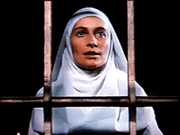In seventeenth century Mexico, a conservative archbishop (Lautaro Murúa) and a politically influential viceroy (Héctor Alterio) share a polite toast to celebrate their respective appointments to the remote colony, away from the turmoil of the Inquisition in their homeland. The viceroy is eager meet an infamous cloistered nun at a local convent named Sor Juana Inés de la Cruz (Assumpta Serna) whose reputation as an incisive and erudite writer, scholar, and poet has reached the intellectual and social elite of Spain, where she is affectionately referred to as the Tenth Muse. Attending a performance of Sor Juana’s latest play, the viceroy and his equally cultured wife (Dominique Sanda) are captivated by the confident and articulate nun, and decide to offer her their protection, against the silent disapproval of the archbishop. The vicereine finds immediate solidarity with Sor Juan’s chosen circumstances, having herself encountered limited opportunities to attain higher education, and the two women develop an intimate friendship. Sor Juana has long led an autonomous existence at the convent, but the upcoming election for a new convent abbess now threatens her privilege to pursue her academic work. The archbishop has covertly allied himself with a stern and accommodating nun named Sor Ursula (Graciela Araujo) who agrees to impose the stringent measures prescribed by the archbishop designed to reform the convent from his perceived moral corruption in exchange for preferential treatment and leniency towards their supporters. In order to counteract Sor Ursula’s clandestine arrangement, the nuns attempt to persuade Sor Juana into challenging Sor Ursula’s candidacy to no avail, citing that such responsibility would prove deleterious for her studies and her writing. Nevertheless, despite the election of the new abbess, Sor Juana continues to devote her time to her work, often accompanied by the supportive vicereine, whose protection insulates her from the strict governance of the convent. However, when the archbishop brings Sor Juana’s impassioned and exalted poetry to the vicereine before the censorship advisors and denounces her work as sensual and provocative, the disfavored nun finds her faith and perseverance tested.
Based on the biographical novel of the renowned poet, Sor Juana: Or The Traps of Faith by Octavio Paz, I, The Worst of All presents a complex, unsettling, and compassionate portrait of iconoclasm, personal sacrifice, and the search for enlightenment. Maria Luisa Bemberg contrasts the excesses of the male-dominated political and religious hierarchy with the austere existence of the nuns to illustrate the dichotomy of social privilege: the circus atmosphere of the magisterial court that precedes the vicereine’s collapse; the archbishop’s introductory election speech from an incongruously embellished ceremonial throne at the sparsely furnished convent; the unusual absence of the ever-interfering clergy that sharply contrasts with the constant medical assistance, acts of contrition, and self-flagellation by the cloistered nuns during the scourge of the plague. Furthermore, through long, static shots, confined staging, and minimized tracking, Bemberg creates a visual metaphor for the pervasive repression and claustrophobia of the times, as Sor Juana struggles to defy social convention and pursue an independent life as an intellectual and artist. Note Bemberg’s use of shadows, darkness, smoke, cloister bars, veils, and eventually, rain to create a pervasive sense of obscurity, suppression, and ignorance that reflected the social roles relegated to women during the ironic period of cultural achievement known as the Golden Age of Spain. In the end, Sor Juana’s resigned inscription, I the worst of all, proves to be a lone and desperate voice of true enlightenment in a crushing age of ignorance, elitism, and repression.
© Acquarello 2002. All rights reserved.
